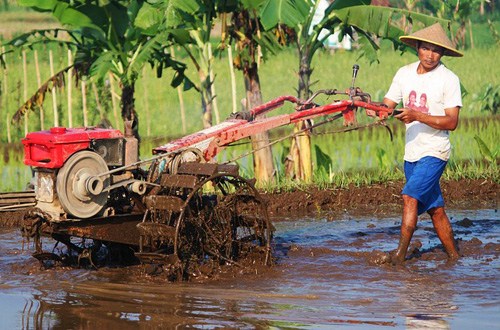Jakarta (Greeners) – A new study found that more than 50 percent of young people from farming family did not want to be farmers.
The study conducted by People’s Coalition for Food Security (KRKP) and Bogor Agricultural Institute’s Agriculture Strategic Research and Policy Directorate assessed farming regeneration of four food production regions, — Kediri, Tegal, Karawang, and Bogor –, especially rice farmers and horticulture farmers.
It showed that 63 percent of children of rice farmers did not want to be farmers. Meanwhile, 54 percent of children of horticulture farmers refused to pass on the family tradition.
Said Abdullah, KRKP’s coordinator, said that less attraction on farming from young generation was a reflection that the profession has no appeal compare to industry sector.
“Young people admit that they prefer to become industry labor because of income certainty. This is serious. It is an urgent matter need to be solved if we want to achieve food security based on Nawacita,” said Abdullah as quoted from a press release to Greeners, in Jakarta, on Wednesday (18/5).
Furthermore, he said that slow regeneration of farmers could threaten food security.
The regeneration issue, he added, could not be tackled from one sector as agriculture and farmers were inter-sector and multidisciplinary issue which required collective efforts from all parties.
He was citing to an assessment conducted by KRKP and Oxfam Indonesia which mapped out factors related to farming, early this year.
He said that access and land tenure, selling price or income, knowledge or education on agriculture, and infrastructure were important factors which could influence the interest of becoming a farmer.
“These factors are key must be addressed by the government to increase farming interest among young generation,” he said.
Meanwhile, Suryo Wiyono, Lead Research of the Agriculture Policy Research Center and Head of Plant Protection Department of IPB, said that farming regeneration started from education.
Suryo said that agriculture educational institution availability must be adaptable with current agriculture development. In addition, vocational education on higher level need to be strengthened to encourage the passion and interest of young generation on farming.
“It is about time to manage the education sector to attract young people to farming,” he said.
Agrarian reform policy can increase access and assets for farmers, subsidy output, income certainty, agricultural education, and better infrastructure.
“Failure of farming regeneration not only threatening food security and sovereignty of the country but also farmers’ welfare and livelihood. Holistic approaches must be taken and we could no longer wasting time if we really want to achieve Nawacita, food security,” he said.
Indonesia is not the only country with farming regeneration issues. Agriculture sector currently going through ageing and declining population of farmers.
Farmers in sub-Sahara of Africa are mostly 60 years old and 55 years in US. Meanwhile, in Indonesia, farmers above 45 years accounted for 61.8 percent and only 12.2 percent below 35 years, based on agricultural census in 2013. For food farmers, 47.57 percent accounts for above 50 years old.
Reports by Danny Kosasih



















































